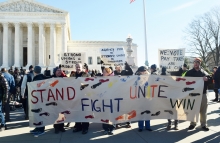U.S. Supreme Court decision gives reprieve to public sector unions

In issuing a 4-4 opinion in Friedrichs v. California Teachers Association, the U.S. Supreme Court today rejected an attempt by wealthy special interests to restrict opportunities for America’s teachers, firefighters, police officers, nurses and others who provide our vital services for our communities to have a voice at work and join together to build a better future for their families.
The result in Friedrichs is meaningful for millions of families across the country, as it is a rebuke against this well-funded attack on workers’ voice and ability to join together.
Says Rosa Pavanelli, General Secretary of Public Services International (PSI): "It is a relief for the whole trade union movement the news that the U.S. Supreme Court has rejected the Friedrichs v. California Teachers Association case. In a time when public services workers are under attack, the Supreme Court rule is an important statement that their right to organise and collectively represent cannot be stripped and are part of the fundamental workers’ rights. It is an important lesson that all trade union movement can learn from, it is to say, that unions' unity together with workers' unity can defeat the greed of those who have the power of money, but not the power of people".
Leaders of PSI affiliates in the United States are celebrating the victory, but are also deepening the struggle to guarantee labor rights to all public sector workers.
“Millions of working people who understand the importance of their unions in bettering their lives and the wellbeing of their communities are breathing a sigh of relief today. Even so, we know this fight is far from over. Just as our opponents won’t stop coming after us, we will continue full speed ahead in our effort to mobilize our members and their neighbors around a shared vision to reclaim the promise of America. While we wait for Senate Republicans to do their job and appoint a new justice to the Court, we’re working hard for the future we want to see—one with vibrant public education from pre-K through college; affordable, accessible healthcare; public services that support strong neighborhoods, and the right to organize and bargain for a fair wage and a voice on the job,” says Randi Weingarten, president of the American Federation of Teachers (AFT).
AFSCME members are also more resolved than ever to band together and stand up to future attempts to silence the voices of working families.
Says Lee Saunders, president of the American Federation of State, County and Municipal Employees: "As public service workers learn more about the Friedrichs case, they are shocked to hear about such a political attack through the Supreme Court, and more motivated than ever to step up, get involved, and organize. It’s never been clearer that our most basic rights are at stake”.
It is clear to Mary Kay Henry, president of the Service Employees International Union (SEIU), that today the Supreme Court rightly protected the workers' ability to join together in the workplace.
"We know the wealthy extremists who pushed this case want to limit the ability for workers to have a voice, curb voting rights and restrict opportunities for women and immigrants, and we know the way to stop them is by taking our fight to the polls in November.”
Momentary victory
The Friedrichs case represented a strategic threat to public sector workers, but this momentary victory does not eliminate this threat. In effect, the Supreme Courts’ inability to form a majority decision provides a reprieve of sorts for public sector unions who were bracing for the worst-case scenario.
United States public employees who don’t join a union cannot be required to pay for the union’s political activities, but in many states they can be charged an “agency” or “fair share” fee to pay for other costs that the union incurs, including grievance representation and collective bargaining.
Public sector unions’ reprieve was made possible by the recent death of Supreme Court Justice Antonin Scalia. His vote would have likely reversed legal precedent to rule that the agency fee system was unconstitutional.

